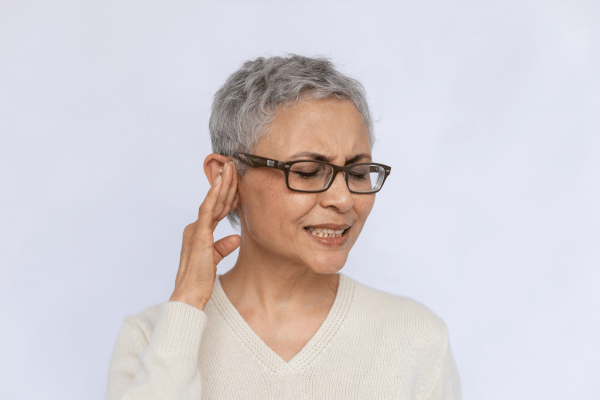What to Do When Ear Eczema Increases While Wearing Hearing Aids

We don’t often tie eczema and hearing aids together, but many people find that they experience an increase in eczema symptoms while wearing hearing aids. Is it really the hearing aids that cause the problems, or is it something else? If you’ve ever experienced itchy ears, you know how awful and annoying it can be each day and night.
It doesn’t just stop with the itchiness, though. The itching and scratching can lead to horrible infections and sores, so it’s not just something that should be ignored. Treating it correctly and effectively can be tricky. Let’s address the issues of what to do when ear eczema increases as you wear your hearing aids.
Does Everyone That Wears Hearing Aids Experience Ear Eczema?
Hearing aids can have a bit of a learning curve even when everything goes right. When there are problems that occur, it can be really aggravating. Many new hearing aid wearers have trouble with itchy ears. The itchiness can be happening for a variety of reasons though. Ruling out allergies or other problems can be helpful in fixing the problem quickly and getting you to a place of enjoying the amazing help that hearing aids can bring to your life.
People who experience ear eczema usually experience it on other parts of their body as well. They have often suffered for years with symptoms, and when it shows up in the ear, it’s simply another outbreak or flare-up.
Contact allergy is the other cause of eczema and ear eczema to be exact. When areas of the ear are rubbing against the hearing aid, you can have an outbreak. These kinds of outbreaks can happen from things like shampoo, certain types of earrings, etc. too.
Problems That Can Arise
There are potential issues that may arise with the use of hearing aids. Just like any kind of tool, it’s a foreign object that the body isn’t used to and so it may react poorly. Some problems that can come up with the use of hearing aids include:
- Earwax buildup – This can easily occur as the hearing aid is pushed into the ear canal, causing it to be blocked. The dead skin and earwax cannot fall out of the ear on their own.
- Ear infections – When the ear has wax buildup and is not able to stay dry, infections can eventually develop.
- Moist ears – After you shower or swim, it’s a must that you thoroughly dry your ears before putting on your hearing aids. If not, you can get swimmer’s ear and other infections. Your hearing aids can also be damaged as well.
- Dry ears – While there is always a worry about ears being too moist, having ears that are too dry can also be an issue. Some people clean their ears too much to avoid swimmer’s ear and other issues. When the area is cleaned too often, though, there are not enough oils left to keep the skin and ear canal healthy and able to prevent itchiness and dry skin.
- Difficulty hearing – This can be caused by the wax buildup and/or infections.
- Ear, neck, or head pain – Most often caused by infection.
- Fevers – Another symptom of infection.
- Ear drainage – A symptom of infection and/or too much moisture being trapped in the ear.
Managing Itchy Ears
If you’re struggling with itchiness on the outside of your ear or down in your ear canal, you probably feel like you’re going out of your mind. It’s hard to concentrate on anything but the itching!
Many people report that the itchy feelings subside over time. Others are so bothered by it that they would rather struggle with their hearing instead of dealing with the irritating feeling that the eczema outbreaks can bring.
You can do things on your own to try to manage the symptoms.
- To be healthy, your inner ears should be kept dry. When this is done, hearing aids can function properly without problems. Try drying your ears with a warm blow dryer to avoid damaging the inside of the ear with other drying tools.
- When swimming, consider wearing earplugs to help keep the water out of your ears.
- Your earmold could be too tight, making it hard for your ear canal to get air. When this happens, moisture can accumulate and cause infection and, of course, itchiness.
- If the earbud portion of the hearing aids is not fitted correctly, they can touch areas of the ear that don’t usually come in contact with things, causing an itchy sensation. Contacting your audiologist for a better fit is your best option. Even the use of a lubricant can help.
- If you or your doctor believes that you are experiencing an allergic reaction, you can investigate hypoallergenic hearing aids made from material such as medical grade silicone.
- Keep your hearing aids dry to avoid bacteria from growing on them. A UV light or special hearing aid dryer can help this as well as make your hearing aids last longer.
- Clean your hearing aids regularly to eliminate any dirt or other buildup from irritating your skin.
- Try wearing your hearing aids a little at a time. Start by wearing them every other day until you are used to them.
- Talk with your doctor and hearing specialist about your symptoms. They may be able to give you medication that can help.
A Hearing Team You Can Count On
Even though hearing aids may be an indispensable device for so many people, it doesn’t mean their use is always as simple as we would like. There are possibilities of allergies, itchiness, and infection. Some people have more sensitive skin than others, and wearing hearing aids is a hard thing to get used to.
For the most part, though, when fitted and worn correctly, hearing aids should not cause any issues and will be a great help. The team at Fairfax Hearing Center stands ready to help if there are problems that arise. Contact our hearing specialists for an appointment or for answers to your questions.

